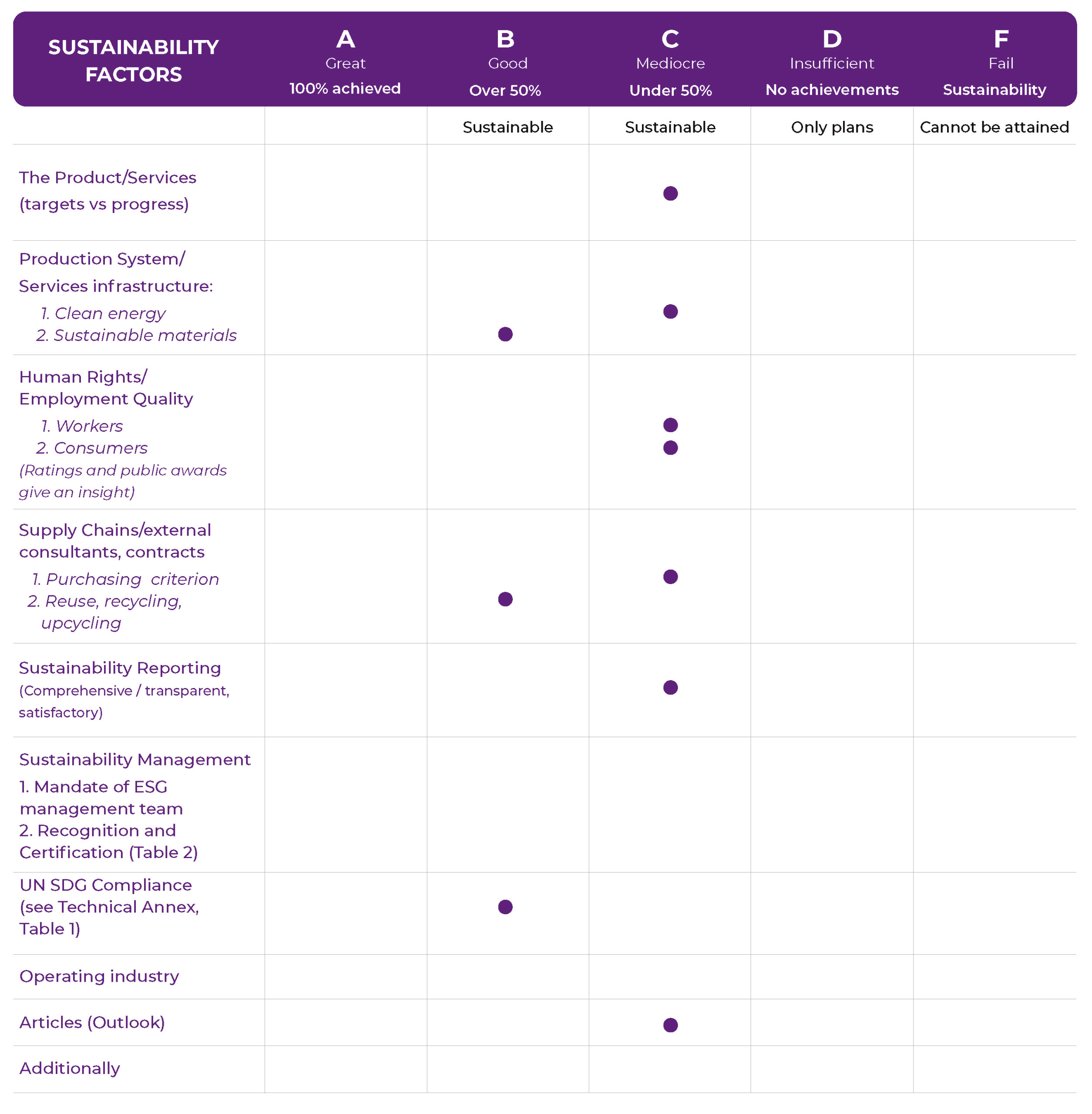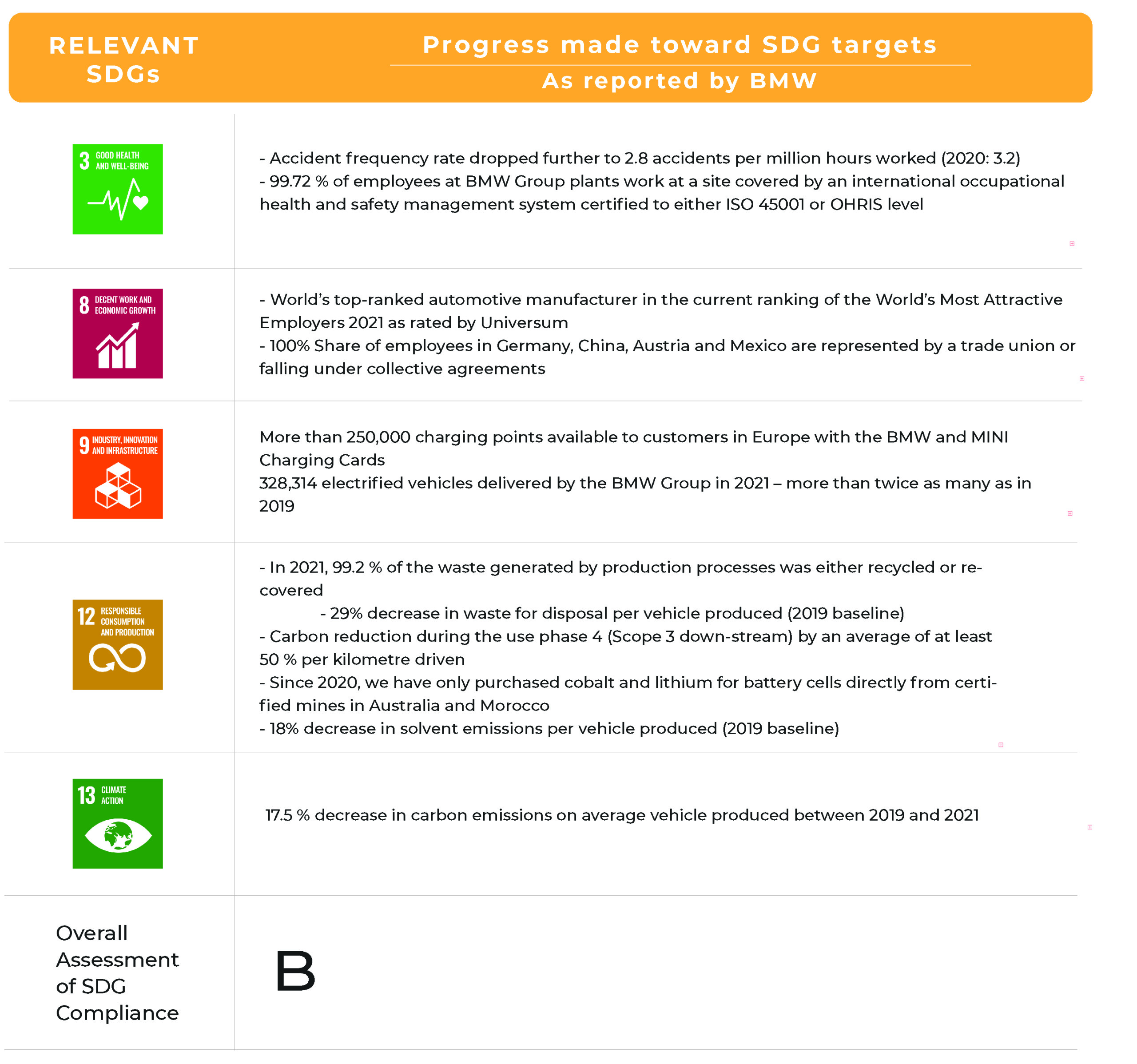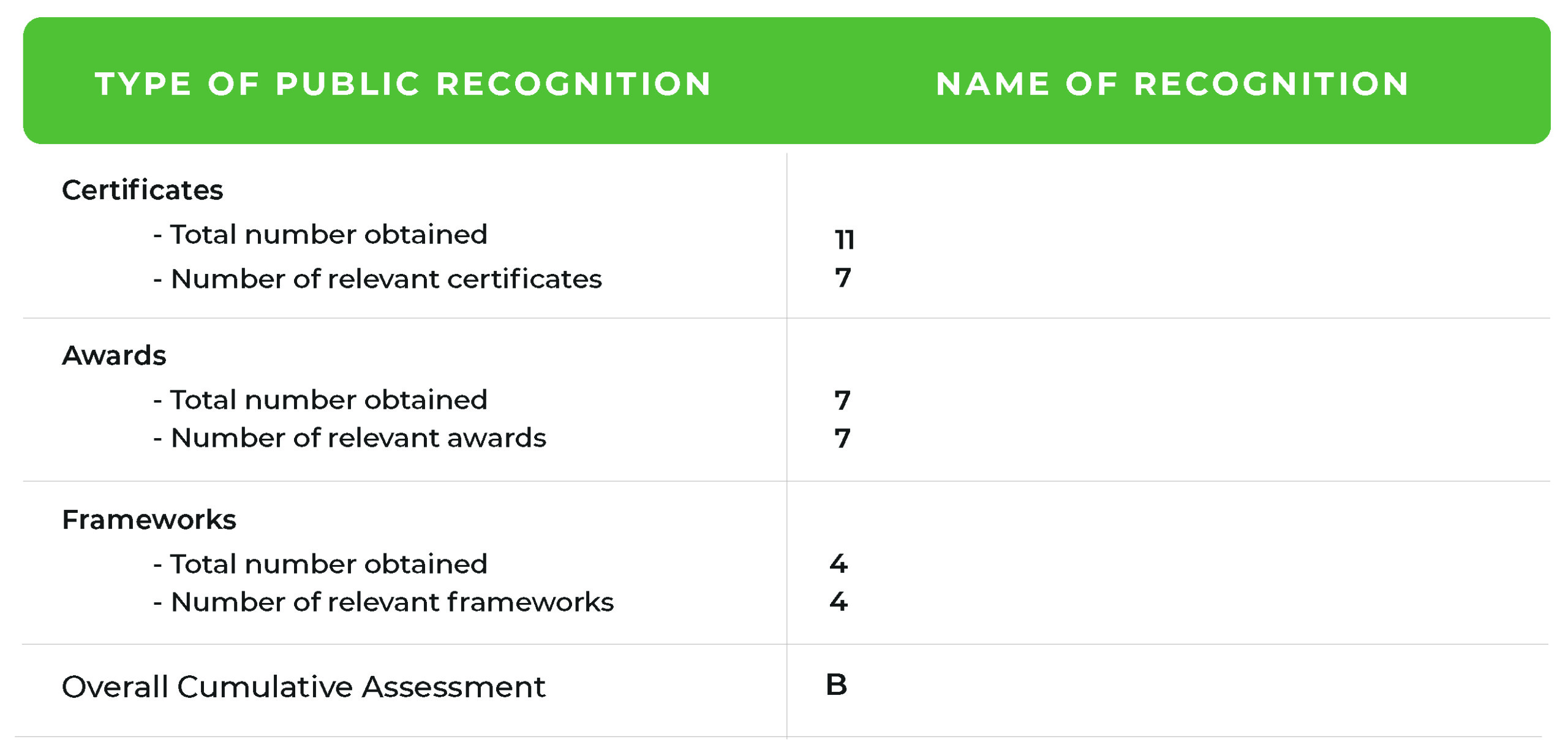
Index Sustainability Report for BMW

Company Evaluation
BMW group publishes the Combined Management Report that includes the Group Financial Statements, the disclosures on corporate governance and the additional GRI information. The reporting period covers the Group’s financial year from 1 January to 31 December 2021. Furthermore, the entire report of BMW AG has been audited by PricewaterhouseCoopers GmbH Wirtschaftsprüfungsgesellschaft.
BMW Group’s report on sustainability related targets and progress is comprehensive, but missing specific goals and also data to measure progress. Additionally, there is no link to the Sustainable Development Goals (SDGs). Starting with environmental goals, BMW is aiming for climate neutrality by 2050, which is 10 years later than what other automotive manufacturers are targeting. One of the reasons identified is that the Group will not be phasing out the manufacturing of vehicles with internal combustion engines, rather it will invest in technologies to reduce the fuel consumption and increase efficiency. BMW Group claims that by continuing to offer “parallel technologies” not only helps with a “smooth transition to the future of electric mobility”, but also with using the existing resources the best possible way. Regarding circularity, there are no goals specific, but rather linked to the climate neutrality by 2050, where the Group is investing in recycling and return of end-of-life vehicles, with already 2,800 return points in 30 countries; almost 30% of vehicles are manufactured from recycled and reused materials, with the goal to reach 50% through the “Secondary First” approach; and lastly the Group is missing a comprehensive strategy on battery recycling. It is hard to determine the percentage of renewable energy used, however the use of green electricity is mandatory in awarding new contracts, particularly with suppliers of energy-intensive products. Furthermore, suppliers responsible for 80% of the BMW Group’s production-relevant purchasing volume are participating in the CDP Supply Chain Programme, with a C average rating score.
Also important to note is that 28 out of 31 plants are covered by the international occupational health and safety management system, ISO 45001. Accident frequency rate dropped to 2.8 accidents per million hours worked, but not many awards related to the workplace environment or employee satisfaction besides an award from Universum as the Most Attractive Employers in Thailand.
In conclusion, BMW Group has established goals, some backed by the Science Based Targets initiative, for some progress can be measured, but others are only initiatives, and on topics such as phasing-out electric vehicles, battery sourcing and recycling, the company is falling behind compared with other automotive manufacturers. The company is rated therefore with D, with a Neutral Outlook.
Outlook: Neutral
BMW Sustainability Scorecard

Sector
Automotive
Technical Annex
Website
Contact
Petuelring 130, 80809 München, Germany
Tel. +49-871-702-3232
Email: Saskia.Graser@bmw.de
Stock Ticker
FWB: BMW
BMW Activity
In Brief
BMW stands for Bayerische Motoren Werke AG and is a German multinational manufacturer of automobiles and motorcycles that operates through several business segments: Automotive, Motorcycles, Financial and Other Entities. The Automotive segment includes developing, manufacturing, assembling and selling of cars and off-road vehicles under the BMW, MINI and Rolls-Royce brands. The motorcycle segment has produced motorcycles since 1923 under the BMW Motorrad. Retail customers can get access to credit financing, leasing and other services through the Financial Services segment. Holding and group financing activities are the responsibility of the Other Entities segment. BMW is headquartered in Munich, Germany and was founded on March 6, 1916.
Employees
118,909
BMW Sustainability Activity
In Brief
The BMW Group aspires to be not only the most successful, but also the most sustainable premium car manufacturer. Setting goals such as to become climate neutral by 2050, drive additional initiatives such as CO2 emission reduction, expansion of electromobility, circularity, commitment to follow the highest environmental and social standards related to employees and the society at large. Specific CO2 emission reduction initiatives include by 2030 to reduce by 40% the CO2 emissions from its vehicles considering the entire lifecycle, from supply chain, through production to the end of use phase. BMW Group is planning on putting on the road an additional ten million fully-electric vehicles. Furthermore, circularity refers to the development of vehicles, using materials from recycling processes and components that can be fully recovered or reused.
Environmental and social standards are also extended to suppliers to comply with, along with human rights, management systems for occupational health and safety and environmental protection. Programs for career advancement, as well as health initiatives and varied diversity programs are available to all employees. And lastly, as a global player BMW Group is committed to help people and cultures around the world through the BMW Foundation Herbert Quandt. As an independent corporate corporate foundation and as a partner, The BMW Foundation Herbert Quandt promotes the UN Sustainable Development Goals as key components for grants’ allocation, collaborations and investments.
Revenue and Market Cap
Annual Revenue: €111.24 billion
Market Cap: €55.26 billion
Sustainability/ESG Awards, Ratings & Rankings
ESG Awards
- World’s Most Attractive Employers 2021 as rated by Universum
- Top spot in the Trendence Professionals Barometer for Germany in 2021
- The 7th Jinxuan Awards – Annual Public Welfare Award
- 17th Corporate Social Responsibility Forum – 2021 Responsible Corporate China Newsweek
- The 8th SuQin Awards Ceremony – “Silver Award” in Social Innovation
- 2021 Golden Flag Award – CSR Gold Award
- Auto-First – China Automotive CSR Golden Key Award
- Trends Home Annual Awards – “Charity of the Year” Award 2021 Trends Home Annual Awards
- Case 36Kr – 2021 Automobile Marketing Innovation
Ratings
- MSCI ESG (Industry Leader, AA)
- Sustainalytics (27.1, Medium Risk)
- ISS ESG
- CDP rating list – A rating
Chief Sustainability Officer
Ursula Mathar
BMW in the news: Press, Reviews and Social Media
In the News
- The BMW Group has taken first place in the “Automobiles” category of the latest rating published by S&P Dow Jones Indices for the Dow Jones Sustainability Indices World and Europe (DJSI), earning 80 out of a possible 100 points. Available at: https://www.automotiveworld.com/news-releases/bmw-group-named-sector-leader-in-dow-jones-sustainability-indices-2020/
- BMW has announced its plans to use plastic waste from fishing nets and ropes to produce trim parts such as floor mats for some of its upcoming cars. The German luxury automaker will deploy an exclusive recycling process for waste material from the maritime industry to produce materials for exterior and interior of its BMW iX, BMW X1 and the much-awaited Neue Klasse. Available at: https://www.whichev.net/2022/09/16/bmw-to-use-recycled-fishing-nets-in-future-vehicles/
- This article criticises BMW, and the industry more general, for producing more EV’s, particularly in the SUV market, but at the cost of more luxurious materials and being bigger and heavier, therefore using up more finite resources, space and energy. Such as the BMW’s 2.6-tonne iX, the 2.7-tonne i7 and now the even heavier XM, at 2.75 tonnes officially the heaviest car it has ever made. Available at: https://www.autocar.co.uk/opinion/business-environment-and-energy/editor%E2%80%99s-letter-are-premium-brands-taking-sustainability
- BMW has announced a wide range of initiatives to instil greater sustainability in the sourcing of materials for parts. They include the use of maritime waste for injection-moulded plastic parts, recycling of steel, aluminium and glass, and the recycling of battery cells. Available at: https://www.automotivelogistics.media/sustainability/bmw-targets-a-more-sustainable-sourcing-of-key-components/43445.article
Certificates
- ISO 14040
- ISO 14044
- ISO 14001:2015
- ISO/IEC 27001
- ISO/IEC 27701
- ISO 45001 at 28 out of 31 plants (99.72 % of permanent employees and 98.98 % of temporary employees at BMW Group plants work at a site covered by an international occupational health and safety management system)
- MLPS 2.0 certification
- China Compulsory Certification (CCC)
- China Quality Certification Centre Material Database System
- LEED certification
- Work Safety Standardisation Level 2 Certification
- International Renewable Energy Certificates (I-RECs)
- Forest Stewardship Council (FSC)
BMW Sustainability Report Highlights
Achievements
- An average of 80 % carbon reduction at production sites and locations (Scope 1 and 2) per vehicle produced
- Carbon reduction during the use phase (Scope 3 downstream) by an average of at least 50 % per kilometre driven and an average of at least 20 % carbon reduction in the supply chain (Scope 3 upstream) per vehicle produced.
- In 2021, 99.2 % of the waste generated by production processes was either recycled or recovered
- The BMW Group reduced its emissions of volatile organic compounds (VOC 3 ) per vehicle produced by 13.6 % to 0.70kg during the period under report
- Specific water consumption in production was improved slightly to 2.15 m3 (2020: 2.25 m3) per vehicle produced during the year under report
- In order to show commitment to the Paris Agreement targets, in 2021 BMW became the first German automotive manufacturer that joined that Business Ambition for 1.5°C initiative of the SBTi and also became part of the international Race to Zero campaign organised by the United Nations.
- The scale of the training initiative is reflected in the significant increase in the number of participants:
- €389 million invested in vocational and further training of BMW Group employees in 2021
- Training measures undertaken across the BMW Group in 2021 involved a total of 1.1 million participants (2020: 770,000).
- Each member of the BMW Group work- force received an average of 23.1 hours of training during the year under report (2020: 16 hours)
- €25 million spent by the BMW Group in 2021 on social projects and other activities in conjunction with its corporate citizenship responsibilities.
- The share of women in the BMW Group workforce as a whole reached 19.7 % (2020: 19.5 %)
Standards and Frameworks
- SASB Index
- GRI
- SBTi for decarbonisation strategy
- TCFD Index
- NFS Index
Table 1: Targets vs Progress Reported

Content Sources
Automotive World. (2020). BMW Group named sector leader in Dow Jones Sustainability Indices 2020. Automobile World. [Accessed 23 Nov. 2022]
Malhotra, P. (2022). BMW to use recycled fishing nets in future vehicles. [online] WhichEV.net. [Accessed 23 Nov. 2022].
Tisshaw, M. (2022). Editor’s letter: Are premium brands taking sustainability seriously? Autocar. [Accessed 23 Nov. 2022].
Automotive Logistics. (2019). BMW targets a more sustainable sourcing of key components. [Accessed 23 Nov. 2022].
Table 2: UN SDGs Compliance Analysis

Table 3: Sustainability Certificates, Awards and Listings










